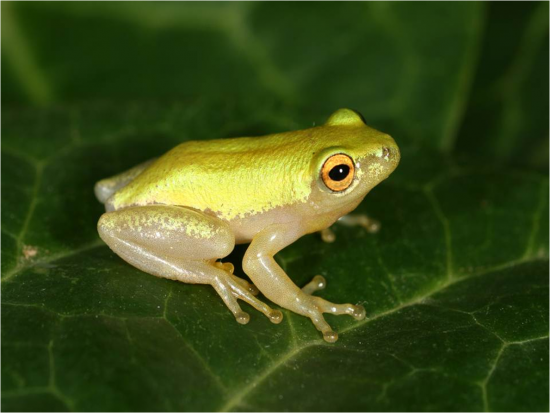Expanding Ex Situ Efforts for the Pickersgill's Reed Frog
The Pickersgill’s reed frog (Hyperolius pickersgilli) is a Critically Endangered species endemic to a very small region of the KwaZulu Natal coast in South Africa. The species was assessed as a high priority for urgent conservation action at the CBSG/Amphibian Ark workshop held in 2008 to assess priorities for South African frogs.

The Situation
The Pickersgill’s reed frog (Hyperolius pickersgilli) occurs in fewer than 20 small wetlands along a narrow, extremely fragmented range. The species’ estimated area of occupancy is only 9 km2. Most of these sites have no official protection and are declining in quality or facing complete destruction. More than 50% of the sites where Pickersgill’s reed frogs occur are believed to be non-viable in the future if current conditions persist. The species was assessed as a high priority for urgent conservation action at the CBSG/Amphibian Ark workshop held in 2008 to assess priorities for South African frogs. Following discussions with the provincial nature conservation authority, ezemvelo KwaZulu Natal Wildlife, a collecting trip was conducted in 2012 to bring the first frogs into captivity to research the captive needs of the species and form the nucleus of an ex situ conservation program.
The Process
Thirty frogs were collected from two sites near Durban. These frogs are managed through a conservation breeding program (APP) of the African Association of Zoos and Aquaria (PAAZAB) with the support of CBSG. In September 2013, CBSG assisted in a conservation planning workshop, hosted by the Endangered Wildlife Trust and ezemvelo KwaZulu Natal Wildlife, to produce the South African government’s “Biodiversity Management Plan” for the species. This plan identified several important roles for the conservation breeding program based upon the IUCN draft guidelines for ex situ management for conservation.
The Results
As of May 2014, all 30 originally collected frogs are still alive and well. Breeding to successful metamorphosis has occurred at two of the participating institutions. The ongoing program is coordinated by the Johannesburg City Parks and Zoo, with an additional two participants keeping frogs: the National Zoological Gardens of South Africa and uShaka Marine World. The rapid success of this program is helping to shape the government’s positive view of ex situ conservation, and CBSG is now working with the provincial government to prioritize ex situ conservation needs of all South African invertebrates.
More
- More about the Pickersgill's Reed Frog.
- More CBSG Highlighted Stories.



